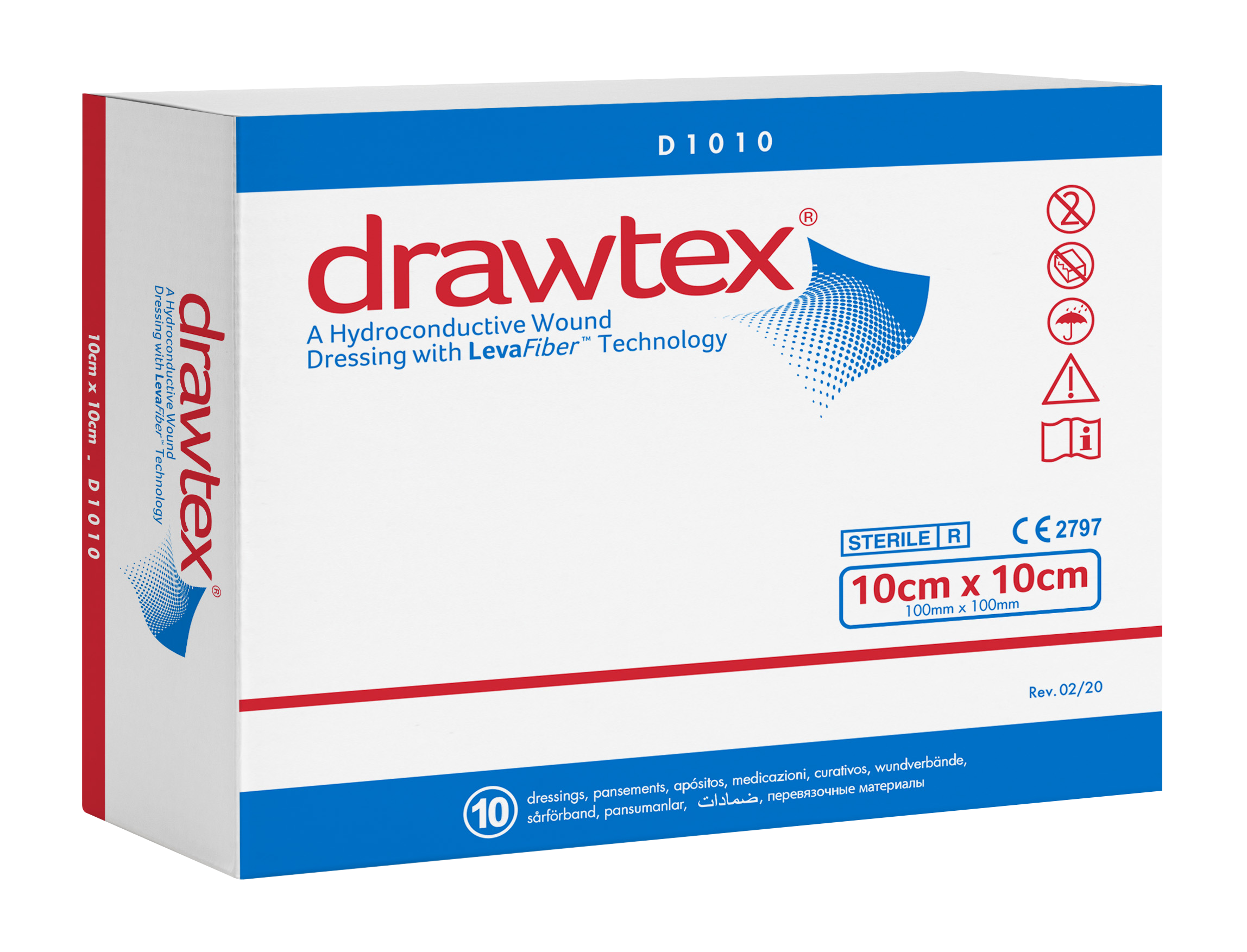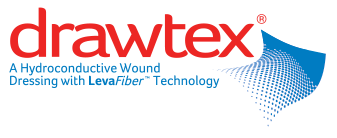Drawtex® Flat Dressings
Utilising LevaFiber™ technology, Drawtex® is a highly effective wound management solution, with triple-action wound healing to remove harmful exudate from chronic wounds, while leaving healthy granulation tissue in place.

Designed for any type of wound
Drawtex® Flat Dressings

Flat dressings ranging from 5cm x 5cm to 20cm x 20cm.

Capillary action
Draws wound exudate & debris into the dressing

Hydroconductive action
Lifts, holds & transfers the exudate away from the wound bed, both vertically & horizontally

Electrostatic action
During wound exudate contact, the surface charge of the dressing facilitates the absorption & removal of large amounts of exudate, bacteria & waste material
Drawtex® is the first hydroconductive wound dressing that features exclusive LevaFiber™ technology, aiding effective wound bed preparation without damaging newly formed tissue. 1-4
Because of its three types of action, made possible by exclusive LevaFiber™ technology, Drawtex® is more than just a simple absorber, and can be used as a first-line dressing as part of the standard of care for wound bed preparation.
Based on clinical data, Drawtex® has been shown to meet the challenges of wound bed preparation in the following ways: 3
As Drawtex® draws the exudate away from the wound surface, it also removes toxic components, such as slough, wound debris and bacteria, that compromise wound healing. 5-12 By dispersing the exudate both vertically and horizontally, Drawtex® controls and retains the wound fluid so that it can be transferred to additional layers of the dressing if needed.
Drawtex® can be easily cut and shaped to fit any type of wound:
Utilising the exclusive LevaFiber™ technology, Drawtex® provides three types of action.
Capillary action
Capillary action gives Drawtex® its ability to move wound exudate and wound debris into the porous material of the dressing. With the small pores acting as capillaries, intermolecular attractive forces between the exudate and solid surfaces of the wound dressing allow the exudate to be drawn upward, against the force of gravity.
Hydroconductive action
Hydroconductive action is controlled by Darcy’s Law, which defines the ability of a fluid to flow through porous media. Fluid can move from wetter to drier – even against gravity. The LevaFiber™ Technology of Drawtex® allows the dressing to lift, hold and transfer the wound exudate both vertically and horizontally, through hydroconductive action.
Electrostatic action
Electrostatic action occurs when the negatively charged Drawtex® wound dressing comes into contact with the wound exudate. Ions from the exudate form a mobile layer of the opposite charge known as the electric double layer, effectively reversing the charge on the surface of the dressing to become positive. This allows the dressing to draw out a relatively large amount of exudate, devitalised tissue, bacteria and deleterious chemical mediators.
Wound bed preparation is the management of a wound in order to accelerate endogenous healing or to facilitate the effectiveness of other therapeutic measures. 2
Recent data shows how wound treatment with Drawtex® meets the complex challenges of wound bed preparation, as described below. 3
Facilitates removal of devitalised tissue
Using an advanced pattern recognition software algorithm to analyse digital wound images, researchers calculated wound measurements and analysed tissue composition of the wound bed. They found that:
- Drawtex® actively draws fluid away from the wound at a rate of up to 150 cc/hour, retaining its integrity when moist. 4
- Drawtex® helps to selectively remove debris from the wound by drawing out adherent fibrin and slough, while leaving healthy granulation tissue in place. 4
Decreases excessive wound exudate
Another study concluded that the advantages of exudate removal by Drawtex® were numerous. Not only was the fluid removed, but nutrients in the exudate that facilitate biofilm production were also drawn off. 5
Decreases the tissue bacterial level
A study that evaluated Drawtex® in an infected burn model demonstrated that the dressing can draw methicillin-resistant staphylococcus aureus (MRSA) from either an inoculated broth or an experimental burn wound eschar. 6
Similar results were reported in patients with chronic wounds, where tissue biopsy bacterial counts decreased from 106 to 102 CFUs per gram of tissue, while at the same time the bacterial counts in the Drawtex® dressings increased up to 104 CFUs. 7
Removes harmful MMPs
Chronic wounds have excessive inflammation, increased pro-inflammatory cytokines, increased proteases such as MMPs, and decreased growth factors.
Removing or decreasing the harmful MMPs is an important aspect of wound bed preparation.
One study reported that Drawtex® could draw MMP-9 and transport it up to 7cm from the wound. 11
Another similar study showed that both MMP-9 and MMP-1 were drawn out of chronic wounds with Drawtex® wound dressings, with a concomitant rise in MMPs in the dressings themselves. 7
Sets the stage for endogenous healing or wound closure procedures
With Drawtex® meeting the goals listed above for wound bed preparation, obstacles to endogenous wound healing or wound closure procedures are lessened or removed.
- Drawtex® can be cut to conform to the wound shape. Any side of the dressing can be used against the wound bed.
- For low exudating or dry wounds, apply a nonadherent (perforated) dressing before applying Drawtex®. For best results, ensure the dressing has direct contact with the wound bed.
- For moderate to highly exudating wounds, apply Drawtex directly to the wound bed. For heavy exudate, apply additional layers as necessary.
- Cover with a secondary bandage of choice.
- Change the Drawtex® dressing every one to three days, as necessary. Once the exudate is under control, the dressing may be changed less frequently. If Drawtex® is adherent, irrigate with saline for easy removal.
| Catalogue # | Size | Carton Qty. | Shipper Qty. |
|---|---|---|---|
| D0505 | 5cm x 5cm | 10 dressings | 10 x 10 = 100 |
| D7575 | 7,5cm x 7,5cm | 10 dressings | 10 x 10 = 100 |
| D1010 | 10cm x 10cm | 10 dressings | 10 x 10 = 100 |
| D1520 | 15cm x 15cm | 10 dressings | 10 x 10 = 100 |
| D2020 | 20cm x 20cm | 10 dressings | 10 x 10 = 100 |
- If arterial bleeding is present
- If the packaging is opened or damaged prior to use
